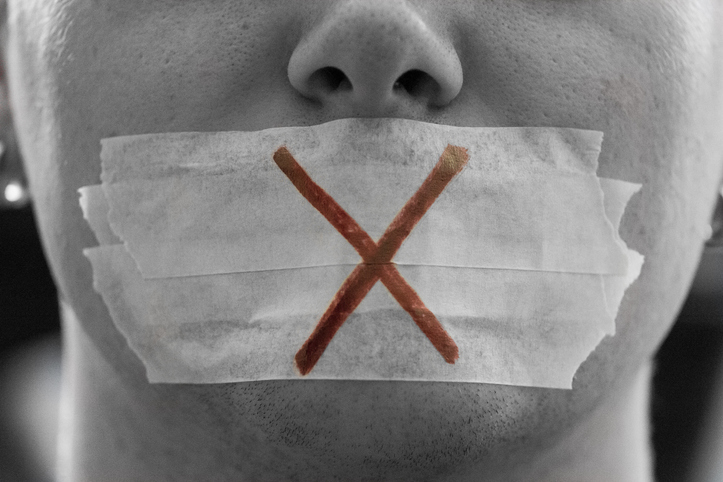One of the world’s most prestigious medical institutions has censored one of its own senior lecturers whose research calls into question the official death toll from COVID-19.
The decision by Johns Hopkins University (JHU) to delete an article from its website on a statistical analysis of COVID-19 fatalities by Genevieve Briand, PhD., is the latest example of establishment organizations suppressing dissenting views on the pandemic.
Briand, assistant director for MS in JHU’s Applied Economics program, presented her findings in a November 13 YouTube lecture that was posted on the JHU website. In her lecture, “COVID-19 Deaths: A Look at U.S. Data,” she examined death statistics in the U.S. in 2020 and previous years, and produced data showing the coronavirus’s toll was not as extraordinary as widely reported.
Focusing on statistics from the three weeks in April 2020 with the highest number of COVID-19 deaths, Briand showed that the rise in coronavirus fatalities almost exactly mirrored the decrease in other leading causes of deaths. Briand says the corresponding decrease in non-COVID death numbers signifies that deaths actually caused by non-COVID diseases were labeled as caused by COVID-19.
Classification of Deaths
Briand’s presentation was quoted in lifesitenews.com on December 2. “The COVID-19 death toll is misleading…deaths due to heart diseases, respiratory diseases, influenza, and pneumonia may instead be recategorized as being due to COVID-1.”
An article in the JHU student newspaper by Yanni Gu on November 22 also summarized the presentation, highlighting the JHU statistician’s key points by citing the Centers for Disease Control and Prevention’s (CDC) own classifications.
“The CDC classified all deaths that are related to COVID-19 as simply COVID-19 deaths. Even patients dying from other underlying diseases but are infected with COVID-19 count as COVID-19 deaths,” Gu wrote. “This is likely the main explanation as to why COVID-19 deaths drastically increased while deaths by all other diseases experienced a significant decrease.”
Gu’s article was posted on JHU’s website and then deleted four days later. In justifying its removal, JHU claimed in its Newsletter on Twitter that the article was “being used to support false and dangerous inaccuracies about the impact of the pandemic.”
“The evidence does not disprove the severity of COVID-19; an increase in excess deaths is not represented in these proportionalities because they are offered as percentages, not raw numbers,” JHU continued. JHU added that “COVID-19 disproportionately affects those with preexisting conditions, so those with those underlying conditions are statistically more likely to be severely affected and die from the virus.”
Yanni posted a response to the removal of her article on LinkedIn on November 27. “I was genuinely upset when I heard the news. Dr. Genevieve Briand has done a truthful analysis of data directly from the CDC website. I believe in scientific integrity and the objective truth, and so does she.”
Unanswered Questions
JHU’s censorship of Briand’s analysis, however, leaves unanswered the question she addressed in her research. Are there accurate data on the number of people who have died directly from COVID-19? How do we classify deaths of people with pre-existing conditions that coexisted with COVID-19?
As Briand and Gu point out, CDC data notably do not identify COVID-19 as the sole cause of death for any 2020 tally of fatalities. Instead, the CDC includes COVID-19 in the same category as flu and pneumonia, leaving the actual cause of death undermined.
“Rather than allow others to freely challenge Briand’s conclusions with facts, the university immediately silenced her, made her a non-person,” says Robert Zimmerman, an award-winning space historian and science journalist who posts regularly on science and technology on his website, Behind the Black. “Open debate is no longer acceptable to them. For them, Orwell’s ‘1984’ was an instruction manual, not a warning.”
JHU is not alone in stifling debate over COVID-19.
Former New York Times reporter Alex Berenson wrote in the Wall Street Journal (Dec. 8) that Amazon twice tried to suppress his self-published booklets critical of measures taken to combat COVID-19 that he believes are damaging, counterproductive, and unsupported by science. Only after protests by business leaders like Elon Musk and media figures like Glen Greenwald did Amazon finally relent.
Berenson’s experience mirrored that visited upon the Great Barrington Declaration released in early October by infectious-disease experts at Harvard, Oxford, and Stanford and signed by over 46,000 medical and public health scientists and medical practitioners around the world. The document pointed to the collateral damage government-imposed lockdowns, including “lower childhood vaccination rates, worsening cardiovascular disease outcomes, fewer cancer screenings, and deteriorating mental health – leading to greater excess mortality in years to come, with the working class and younger members of society carrying the heaviest burden.”
Within a few days, the declaration was condemned by the World Health Organization (WHO) Director-General Tedros Adhanom Ghebreyesus, former CDC Director Tom Frieden, and a Washington Post op-ed. All accused the declaration of advocating a strategy of herd immunity to combat the coronavirus when the document clearly states that achieving herd immunity should be a goal.
The Danish authors of a rigorous study using a randomized controlled trial to investigate whether the wearing of masks protects their wearers from COVID-19 went for months without finding a medical journal willing to publish their findings. The study, eventually published by Annals of Internal Medicine (Nov. 18), concluded that masks do little to stem the spread of the coronavirus.
Bonner R. Cohen, Ph.D., (bcohen@nationalcenter.org) is a senior fellow at the National Center for Public Policy Research.
